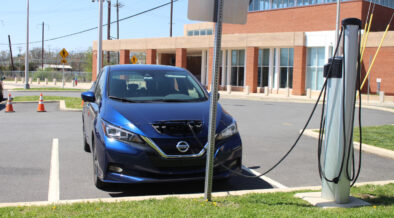-
 play_arrow
play_arrow
Radio Rehoboth
Installing Charging Stations, Rehabilitating Homes: Delaware’s Vo-Tech Schools Teach In-Demand Skills


Hooking up charging stations for electric vehicles, helping to rebuild long-neglected sections of Wilmington, adding phlebotomy skills on top of training to become certified nursing assistants — these are just some of the skills students have been learning lately in Delaware’s vocational-technical school districts.
“We have to stay ahead of the curve,” says Joe Jones, superintendent of the New Castle County Vocational Technical School District, in addressing the charging stations initiative, but he could just as well have been talking about any of the initiatives in vo-tech schools throughout the state. Earlier this year, the district received a grant to install two charging stations outside Delcastle Technical High School, near the electrical trades shop area, Jones says. Each station can charge two vehicles at a time.
Electrical trades students at Delcastle are now learning how to make the necessary connections to place these charging stations in residential or business settings. Eventually, Jones says, the district hopes to add charging stations at its three other schools: Hodgson, Howard and St. Georges.
Another future goal, he says, would be to include training in electric vehicle maintenance and repair in the district’s auto technology curriculum. “If the state goes in this direction, if the nation goes in this direction, we have to equip our students,” Jones says.
There are already considerable signs of such movement.Gov. John Carney has proposed that the state adopt a revised version of California rules requiring automobile manufacturers to gradually deliver an increasing percentage of zero-emission vehicles to dealerships, starting with the 2027 model year and culminating in a total ban on sales of new gasoline-powered vehicles in 2035.
Building the Future
The vo-tech district is also partnering with the city of Wilmington on a program that gives its students and young residents of the 19801 and 19802 ZIP codes the opportunity to get paid while learning construction skills as they rehabilitate homes on the city’s East Side. The Wilmington Future Builders Program, funded for two years with $590,000 from the American Rescue Plan Act (ARPA) provides classroom training, vocational training and on-site experience to participants, who earn $12 to $15 an hour.
“We have over 20 students in the program. Some will get hired full-time,” Jones says. “They’ve been renovating a house on the East Side — stripping floors, building a deck, everything from demolition to construction, depending on their skill set.”
Another new program, Jones says, is an Information Network Technology program at Howard, a broadening of the school’s computer networking curriculum to include IT skills development. “It’s all because of the banks,” Jones says, noting that JPMorgan Chase and Delaware Technical Community College have assisted in building the curriculum. Students in the program can earn up to 30 college credits, putting them halfway to an associate’s degree while following a path to a potentially well-paying career in one of the state’s growth industries, he says.
Skills for All Ages
Downstate, the Sussex County Vocational Technical School District is expanding opportunities for students by developing linkages between its day and adult education programs. With about 1,375 students enrolled at Sussex Tech and another 2,500 participating in adult education programs, the school is just as busy in the late afternoon and evening hours as it is during the traditional school day, Superintendent Kevin Carsonsays.
The best example of the linkage, according to Sussex Tech Principal Matthew Donovan and Adult Education Supervisor Kelly Whaley, is a phlebotomy program that previously had been offered in the adult education division. In the past school year, seven high school students in the certified nursing assistant (CNA) program received classroom instruction in phlebotomy as they earned their CNA certification, Donovan says. Then, Whaley says, these students did their lab work alongside adult ed students to earn a phlebotomy certification.
Phlebotomy served as a pilot for future collaborations between the district’s day and evening programs, Carson says. Next in line will be day/evening arrangements to strengthen programming in the electrical trades, HVAC, refrigeration, plumbing and masonry, he says.
Donovan says Sussex Tech is also proud of its successful launch of a Coast Guard Junior ROTC program, one of only six in the nation. The goal was to have 100 participants after four years, he says. With 80 students enrolled in 2022-23, “we’ll make that goal easily,” he says.
The cadets serve as tour guides and fill other leadership roles, he says. “They really add to the culture in the building. ”The biggest change this year at the POLYTECH School District in Kent County is in the district office, not in the classrooms.
Amelia Hodges has retired after four years as the district’s superintendent. Kevin Dickerson, former superintendent of the Milford School District, succeeded her on July 1.
Looking ahead, the vo-tech schools will continue to evolve to meet the state’s employment needs. A new building is being planned for Sussex Tech, and are placement for Hodgson Vo-Tech in Glasgow is also in the works.
The new Hodgson, Jones says, is likely to become the home for a couple of programs now in the early planning stages — one in advanced manufacturing, the other in biopharmaceuticals. “We don’t know what they’ll look like at the high school level,” he says, but they would pair up well with the research businesses establishing a presence at the University of Delaware’s STAR Campus, just a couple of miles north of Hodgson.
Go to Source:https://delawarebusinesstimes.com/supplements/installing-charging-stations-rehabilitating/
Author: Larry Nagengast
Written by: RSS
Similar posts
Chart
Top popular

News Briefs 10/17/23
Board of Commissioners Workshop & Special Meeting – November 6

Six Sussex road projects considered in latest CTP
NFL Week 17 highlights: Packers, 49ers, Saints, Steelers win, Cardinals stun Eagles
Knicks vs. Cavaliers prediction, odds, line, spread, time: 2023 NBA picks, Nov. 1 best bets from proven model
Copyright 2023 East Sussex Public Broadcasting, Inc.





